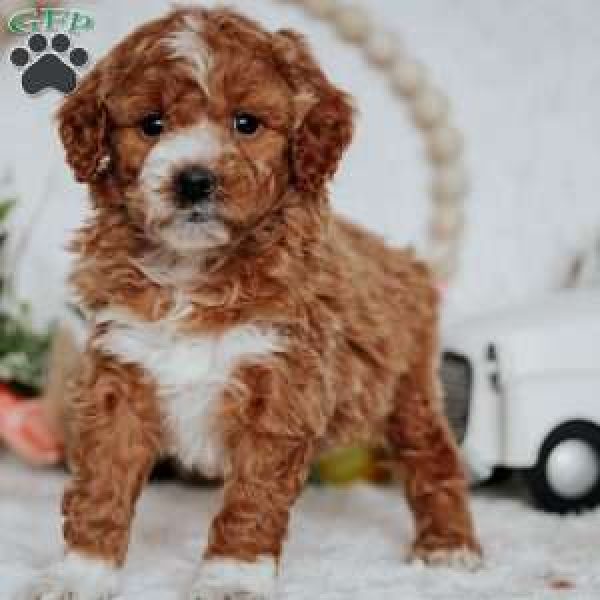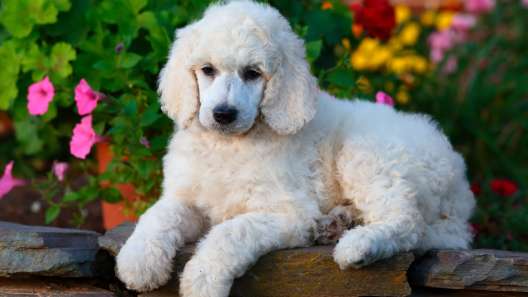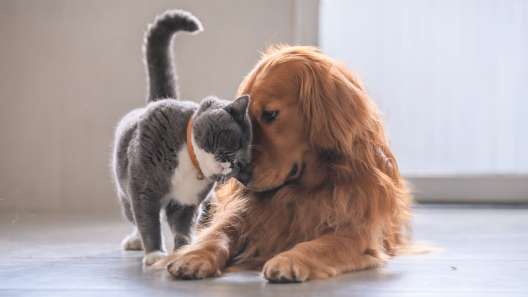
-
Activity Level:
moderate
-
Shedding Level:
low
-
Grooming Level:
moderate
-
Trainability:
high
-
Good for Novice Owners:
high
-
Adaptability:
high
-
Kid/Pet Friendly:
often
-
Prey Drive:
low
-
Watchdog:
chill
- Average Size: Small
- Average Lifespan: 10-15 years
- Registered?: other
Mini Goldendoodle Dog Breed Information
Overview
Temperament
Adaptability
Health
Owner Experience
Grooming
Activity Level
Size
Life Span
Did You Know?
The Mini Goldendoodle is a smaller version of the ACHC-recognized Goldendoodle. It is a cross between a Miniature Poodle and a Golden Retriever, a Miniature Poodle and a Goldendoodle, a Mini Goldendoodle and a Mini Poodle, or two Mini Goldendoodles.
The breed continues to see an increase in popularity as people love the low/non-shedding properties any breed mixed with a Poodle can possess. Although this breed is very popular, it is not currently recognized by the American Kennel Club.
With some of the friendliest and most affectionate dog breeds as parents, it’s no wonder that the Mini Goldendoodle tends to be a sweet, loving, intelligent, cheerful, and playful dog that bonds closely with their families.
As long as they are well-socialized, Miniature Goldendoodles tend to make excellent family companions. They tend to get along well with children, other dogs, and other pets. Although they will alert you of strangers at the door, they tend to warm up quickly as they are more interested in making friends and receiving attention.
Mini Goldendoodles are highly adaptable dogs. Their smaller size makes them a great fit for apartment living or for bigger homes with yards where they can run. As long as they get enough daily exercise, mental stimulation, and attention, they can adapt well.
These little dogs tend to do well in just about any climate. However, like any dog, they are sensitive to heat. Due to their smaller size, you may need to gear up with some dog-friendly winter gear when temperatures start falling.
Because this dog breed is loyal and people-oriented, they love to be in your company and do not like being left alone for long periods of time. This means they can be prone to developing separation anxiety if you do not work with them on it early on.
Instead, make sure your new Mini Goldendoodle puppy has an active role in your life. If you do need to leave them alone for a bit, make sure they have some comforting toys or challenging puzzles to keep them from getting bored.
Although mixed-breed dogs can sometimes be healthier than purebred dogs, it’s not a guarantee and good breeding practices make a big difference.
Potential health concerns to be aware of in a Mini Goldendoodle include hip dysplasia, elbow dysplasia, von Willebrand’s disease, luxating patella, progressive retinal atrophy, cataracts, and hypothyroidism.
Reputable breeders will screen their dogs to avoid passing preventable issues to puppies. Make sure you are asking about the health and genetic history of the parents. You can also ask about any health tests and clearances that have been done.
The Mini Goldendoodles is a highly intelligent dog that picks up on things quickly and is eager to please. They tend to be sensitive to tone of voice as well. As long as training is consistent and focused on positive praise and reward, a Mini Goldendoodle will strive to be obedient and impress you and tends to excel at almost any task.
These traits make the Mini Goldendoodle one of the best dog breeds for first-time owners and a good fit for owners of all experience levels. Puppy training classes can still be a good idea even if you don’t necessarily need them for training because they also often offer opportunities to socialize a puppy and bond with them.
Although a Mini Goldendoodle tends to inherit the low/non-shedding Poodle coat, they still need some regular grooming and maintenance to keep their coat healthy and looking great. Daily brushing is recommended to remove tangles and prevent mats. Bathing is occasional and can often be relegated to the dog groomer that is recommended you visit every 6-8 weeks.
In addition to coat care, you will also need to take care of your Miniature Goldendoodle’s nails, ears, and teeth. The groomer can help handle some of this during visits, but you will still need to do some maintenance at home between visits.
Nail trims once or twice monthly keep nails from growing too long. Weekly ear checks with careful cleanings as needed help prevent ear infections. Daily brushing, plus cleanings at the vet as needed, is good dental care for dogs and can help prevent painful dental diseases later in life.
Although the parents of this breed have a lot of energy, a Mini Goldendoodle tends to sit in a more moderate activity range. Daily walks plus some playtime and time to run are usually enough for them. But, they are also likely to match their energy level to yours, so be prepared for some bursts of energy as well as plenty of cuddling on the couch.
Fully-grown Mini Goldendoodles usually stand 13-20 inches tall at the shoulder. A Miniature Goldendoodle puppy can vary in size based on the generation of the dog.
An F1, or 1st generation cross, would be 50% Miniature Poodle and 50% Golden Retriever. The result is generally a dog that will range from 30-40 pounds. When a Mini Goldendoodle is crossed with a Mini Poodle, the result is an F1-B or 2nd generation cross.
This hybrid dog breed would be smaller in size, around 15-30 pounds, and would be more likely to inherit the low/non-shedding coat properties based on the fact that it is 75% Poodle. Looking at the size of the parents for an F1 or F1-B puppy can be a good indication of what size to expect in a fully-grown Miniature Goldendoodle.
Mini Goldendoodles generally live for 10-15 years on average.
Miniature Goldendoodles are also sometimes referred to as Miniature Groodles or Mini Groodles.









